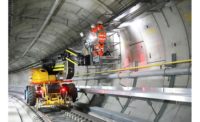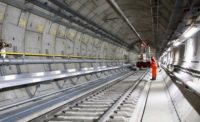One of Europe’s largest and most complicated infrastructure programs was heading for an on-time opening last month while being held up as a model of good project delivery.
But weeks before the planned event, London’s $19-billion Crossrail transit megaproject was found to be in deep trouble— forcing a top-level resignation and major budget and schedule resets.

The surprise revelation last summer that the line would be nine months late created friction, pitting city Mayor Sadiq Khan and transit agency Transport for London (TfL) on one side, and Terry Morgan, former chair of project delivery firm Crossrail Ltd., on the other.
London legislators are probing whether Morgan, who quit in December weeks into his new job, told the mayor and TfL of potentially huge delays last summer.
Evidence of serious management failures is emerging from what senior project executives have told investigators. “
None of the stations could have been ready for December … none,” says Mark Wild, London Underground managing director, who became Crossrail CEO in November and will return to his former role when the project is done.
“There are thousands of hours of construction work to do in the tunnel,” says Wild.
The firm is building the roughly 100-kilometer Elizabeth line from Reading and Heathrow Airport in the west through 42 km of new tunnels under central London to Abbey Wood in the east (see map above).
Eight boring machines finished tunneling in June 2015, opening the way for fit-out and commissioning.
As a senior TfL executive, Wild was on Crossrail’s independent board, along with a director named by project cosponsor Dept. for Transport. Wild recalls “stresses and strains” emerging on the project from mid-2017. By last summer, he thought the opening plan would have been “very difficult.”
The plan was to launch service on east and west sections, with trains starting up in 2017 and 2018 respectively. The new central section service was to begin last December, followed by trains from east and then west running through tunnels.
Unaware of the scale of project noncompletion before becoming CEO, Wild says he “actually felt our problems were more about sequencing.”
By taking out “a little bit of functionality,” the opening could have happened in January or February, he says. Wild now knows “the project was never in that situation.”
Following investigations, Khan announced in December that the project would need another $2 billion to $2.6 billion to finish, with the opening delayed to an undisclosed date after 2019.
“There was a gap between what we were being told and what was happening on the ground,” says Khan, who adds he “lost confidence” in Morgan and agreed with Secretary of State for Transport Chris Grayling that the CEO should step down.

Morgan’s imminent departure was leaked and he gave an account of events to media before quitting on Dec. 5. He also lost his new role as chair of HS2 Ltd., the company building the London-to-Birmingham high speed railroad.
Morgan had chaired Crossrail since 2009 and was reappointed last June, earning $322,000 a year for two to three days of weekly work. He was named by Grayling a month later to the HS2 role, paid a $258,000 annual salary for two days a week.
Wild does not believe the project’s uncertain state was deliberately hidden.
“You are relying on very experienced executives and project representatives telling you what the truth is. It’s clear to me now something has gone wrong in the valuation and estimation of the work to come,” he says.
Why the scale of work was so underestimated is still not clear, but optimism bias appears to be key. Asked why he had erroneously told legislators that the Bond Street station would be ready on time, Morgan said “the project team had a fantastic can-do attitude.”
Senior project managers “are wired” to beat insurmountable problems, says London Transport Commissioner Mike Brown.
“That’s actually why on most occasions they are extraordinarily good at delivering fantastic infrastructure,” he adds. “On this occasion some elements of that optimism were clearly not well founded.” Brown says he feels that project sponsors lacked sufficient oversight.
The Crossrail company was established in 2008 as an independent TfL entity to avoid “dabbling” by officials, he explains.
Management responsibility “sat with an independent board, and an independent chair [Morgan] who actually was responsible for the delivery of that project,” he says.
Its structure “prevented me or TfL from getting involved in the detail of the management,” Brown adds. “A year ago … not many people … would have said it was a flawed model. As it turned out there were clearly some shortcomings.”
Many more months will be needed to complete fit-out and fine tune the trains’ onboard computers to manage three signaling systems.
But the railroad remains “a wonderful program,” says Morgan, adding that the Elizabeth line “is something I am very proud of. Nothing will ever change that.”






